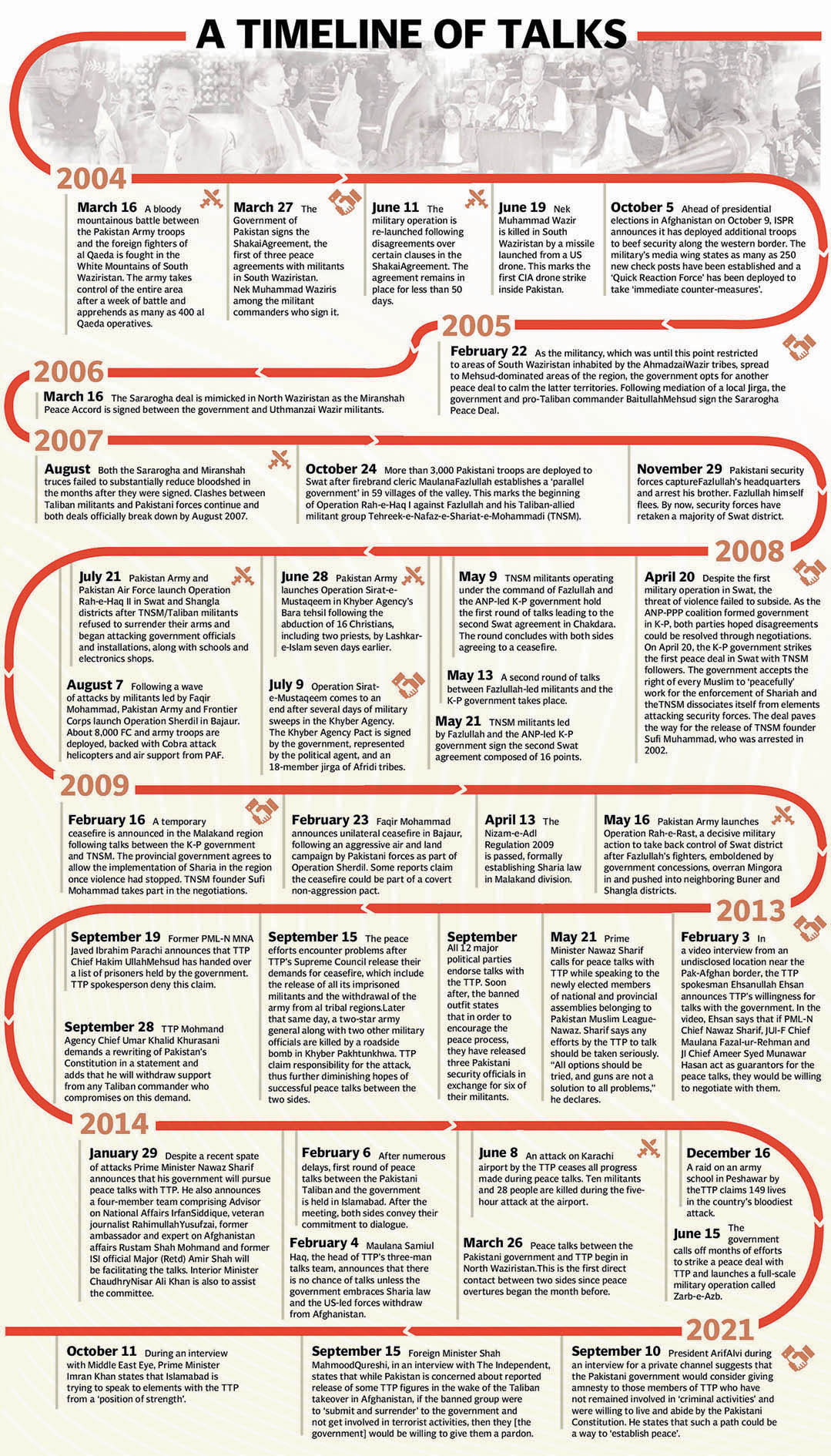Monitoring Desk: Naveed Hussain of the Express Tribune explores the historic perspective of political negotiations with terrorists and banned outfits in reference to strategic, political, and social gains. He spoke with spoke to counterterrorism experts on why negotiations with TTP may not be such a bad idea. Hereunder is his article:
Prime Minister Imran Khan recently dropped a policy bombshell. That his government is reaching out to the Tehreek-e-Taliban Pakistan in a renewed push to convince the proscribed group to renounce violence possibly in return for amnesty for its members from criminal prosecution. The talk of amnesty sparked a frenzied debate in the media. And the consensus of opinion was overwhelmingly against “negotiating with terrorists”. Understandably so! The argument is simple: negotiating with terrorists is akin to legitimising them and incentivising the use of violence for a political change in a liberal democracy. This debate was driven by the “righteous anger” at a “morally wrong” decision and hence offered little light for policymakers. Critics of the non-violent strategy also say that not everybody in the group might be amenable to talks. And this could lead to fragmentation or splitting within the group. If that occurs, then the hardliners might unleash more deadly violence. They claim that negotiated settlements of terror conflicts are often fragile and susceptible to vicissitudes. This leaves the use of military means as the only potent strategy to deal with terrorist or insurgent groups.

The Express Tribune spoke to counterterrorism experts on why negotiations with TTP may not be such a bad idea
But this strategy runs the risk of being counterproductive. Terrorists might use it to win sympathies, radicalise the “reconcilables” in their ranks, and enlist new recruits. Negotiations, on the contrary, can steer the conflict away from violence, even if for a limited time period. This strategy could offer the groups an opportunity to voice their grievances, which could, in turn, further soften the “reconcilables”. The fear of legitimation should not prevent states and governments from negotiating with violent groups because this could help reduce violence, assuage the feeling of alienation, reverse, or at least halt, radicalisation, and wean their members off violence. On the other hand, de-legitimising violent groups as “terrorists” would only shrink their options of becoming anything but terrorists.
The use of kidnappings, bombings, and wanton violence against civilian population defines a group as terrorist because the rule of conventional war prohibits deliberate use of such tactics in combat. Some scholars hesitate to use the label terrorist for any group because, they believe, it can change tactics anytime. “No one was born a terrorist. People change. Movements adopting terrorism also change. Terrorism is a tactic not a defining characteristic,” says Prof. Mark Juergensmeyer, Interim Director, Orfalea Center for Global & International Studies at University of California, Santa Barbara. “So of course, it is useful to talk with those adopting this tactic to understand their perspective. Only then can one effectively respond to them and perhaps ameliorate the conditions that led to the adoption of this tactic in the first place,” he tells The Express Tribune.
Once a group is formally designated as terrorist, negotiating with it becomes more controversial – and understandably so. “But slaughter and desolation are no longer considered acceptable strategies,” says Brian Michael Jenkins, Senior Adviser to the President of RAND Corporation. “Governments offer negotiations for practical reasons – mostly because they cannot suppress the group or the movement with means that are considered acceptable. The ancient Romans could, as Tacitus wrote, ‘make a wasteland and call it peace’.”
A non-violent end to a violent campaign may not be the objective when governments initiate negotiations with a group. “Governments may enter negotiations to lower the level of violence or create divisions in the enemy’s ranks. There is an inequality inherent in this. Insurgents/terrorists have power primarily due to the continued violence — without violence, they may have little power, and even may fall apart. They know this and therefore are reluctant to give up the fight,” says Jenkins, who has authored numerous books, reports, and articles on terrorism-related topics.
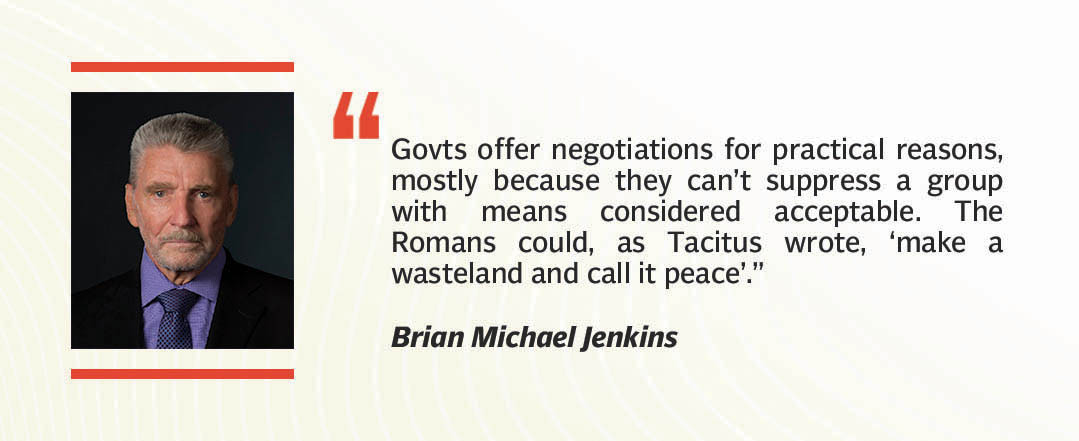
Now, here’s the catch. “Governments want to reduce violence. Terrorists see negotiations as a continuation of the armed struggle. Governments see negotiations as an alternative to continued conflict,” Jenkins tells The Express Tribune. But this could also be turned into a boon. “The governments may use negotiations to shift responsibility for the continuing conflict clearly to their foes and thereby justify the implementation of harsher measures.”
Given the asymmetry in expectations, Jenkins cautions that “government negotiators must avoid becoming too dedicated to making a deal. Bad deals are easy to get. Armed contests may last decades.” Negotiations may take many years. Negotiations require even more strategic planning than military operations. The Irish Republican Army (IRA)’s terror campaign lasted 29 years; Sri Lanka’s Liberation Tigers of Tamil Eelam (LTTE) protracted its deadly campaign for 37 years; the Communist insurgents in Guatemala and Peru fought for 36 years; and Basque separatism plagued Spain for more than half a century.
The employment of military means in counterterrorism has been inherently controversial because the strategy is fraught with the risk of causing collateral damage. Take for example Sri Lanka, where widespread human rights abuses were reported during the military’s decisive push to quell Asia’s longest insurgency in 2009. It is the state which, in such situations, becomes guilty of use of disproportionate force.
“The ‘fighting fire with fire’ approach to terrorism seldom works. If a movement sees the world through the lens of cosmic war, it is often actually energised by the militant attempts to subdue it, and its own militancy becomes even more fierce,” says Juergensmeyer, who is regarded as a leading expert on religious violence, conflict resolution, and South Asian religion and politics.
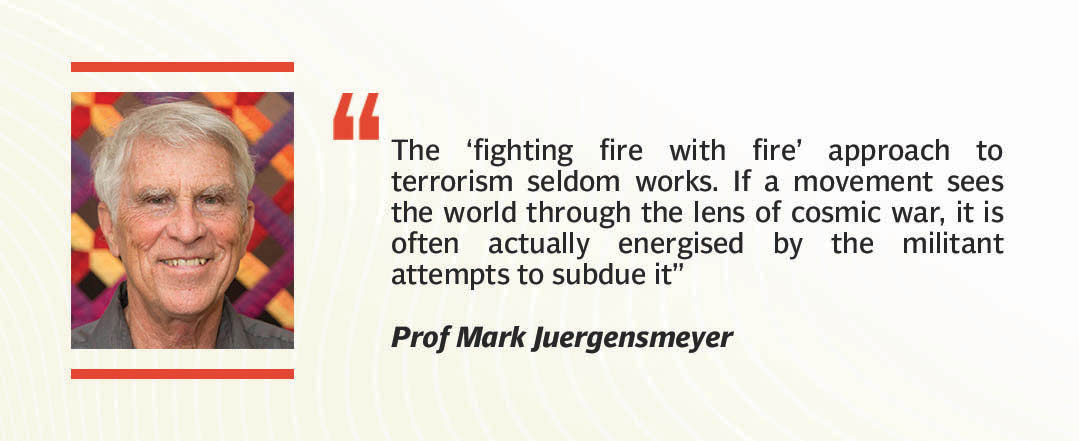
“I just finished a book on how terrorist movement ends, ‘When God Stops Fighting: How Religious Violence Ends’, and I conclude that most movements either collapse from within due to infighting and disorganisation, or they come to the realisation that their tactics are counterproductive and they switch course,” he says while referring to his book which is based on three case studies: the Islamic State of Iraq and Syria (ISIS), the Khalistan movement in India, and the Moro movement in the Philippines. “They [violent movements] are seldom destroyed solely by military force, though sometimes military force is the coup de grace that finally ends them.”
But Jenkins, a leading authority on terrorism and sophisticated crimes, believes each situation is unique, and one-size-fits-all approach doesn’t work. According to him, governments engage terrorists in negotiations only when they are convinced that the violent campaign could be put out no other way. They are unlikely to open negotiations if they were able to suppress the terrorists with police measures or military force.
“Terrorist groups have been effectively suppressed without dialogue — Italy’s Red Brigades, Germany’s Red Army Faction, the many little terrorist groups that were active in the United States were eliminated by police measures without dialogue,” says Jenkins to substantiate the point. But that doesn’t mean the use of military force should be the preferred strategy. “The British government ultimately entered a political dialogue with the IRA and Spain entered a political dialogue with ETA. Colombia entered negotiations with FARC. Guatemala and El Salvador ultimately entered into negotiations with guerrillas (who also used terrorist tactics).”
There is a perception that for those countries with terrorists inside their borders, negotiation is a necessity rather than an option. Take Algeria for example where the government negotiated with the Armed Islamic Group (GIA); or Somalia, where the government caused a split in al-Shabab by weaning off the “reconcilables”. But Juergensmeyer, who has published thirty books on religious violence-related topics, says negotiation is always appropriate because an all-out assault can backfire with even more violence in response. “This is the mistake made by Indira Gandhi in authorising troops to battle Bhindranwale in Operation Bluestar. She paid for it with her life,” he adds.
Juergensmeyer believes negotiations “can effectively separate those within a group willing to talk and those who are not. It may not always work with all members of a militant group, however, especially if the militants have a cosmic war view of the world and regard the government as a satanic force of evil,” he says. “In such a case a third party may be able to intercede.”
Jenkins agrees that negotiations can be a means of fracturing a movement. “[In religiously-motivated violent groups], there are irreconcilables determined to continue a struggle they believe is mandated by God. There also may be more pragmatic elements who would prefer not to spend the rest of their lives at war. Negotiations could sharpen these differences,” says Jenkins, who had also served as adviser to the US National Commission on Terrorism from 1999 to 2000. “But the differences also mean that complete peace may not be achieved. There will be no deal that is satisfactory to all of the factions. The hardliners will continue the struggle.”
In his book ‘Terror in the Mind of God’, Juergensmeyer points out that religion provides motivation, justification and channels of recruitment that few secular movements have. Moreover, religious traditions have the powerful image of cosmic war — the existential conflict between right and wrong, good and evil — that is often central in the thinking of the activists in religious-related terrorist movements.
Jenkins believes such groups are difficult to negotiate with compared to secular, separatist and ideological terrorists. “Groups that believe they are acting on God’s instructions are difficult to deal with — they do not concern themselves with mortal constituencies. Compromise is viewed as apostasy.”
Juergensmeyer doesn’t agree. “Any group can be so entrenched in a ‘we-they’ view of the world that it resists dialogue and change. When a group is weary of bloodshed and ready to seek a resolution it can change, regardless of whether religion is involved. A good example is the peace agreement in Northern Ireland after years of blood.”
Some experts say that there is a risk that the non-violent strategy might backfire and create more radical and violent factions within groups, making it even harder for governments to deal with them. According to Juergensmeyer, negotiation always involves fragments of a group involved in terrorism. “In other words you start talking with any element that will be willing to talk. This is what happened in the Northern Ireland agreement; hardliners bitterly opposed the peace talks, but eventually they won out. The same happened with the Moro movement in the Philippines; Abu Sayyaf is still resisting, but the main movement has negotiated successfully with the government for a new Muslim majority region, Bangsamoro.”
Jenkins agrees that fragmentation is inevitable because there is unlikely to be any deal that satisfies an entire group. “Even today, more than 20 years after the Good Friday agreements that ‘ended’ the IRA terrorist campaign, there are small successor groups that continue the armed struggle,” he says. “Following the withdrawal of British forces from all but the six counties of Northern Ireland in 1921, a civil war broke out in the new Irish Republic. It is possible that those who accept a negotiated settlement could become allies of the government in efforts to protect themselves by attacking those still at large.”
Defence and security analyst Maj Gen (retd) Inamul Haq believes splits could make counterterrorism easier, especially in the context of TTP which, he says, is not a monolithic group. “It is an umbrella of small outfits having different objectives and motivations. In splitting, you deal with each faction locally, sanitize and pacify the area in which it operates, and move to other areas. That is how you expand terror-free zones,” he tells The Express Tribune. Like Jenkins, Inam also believes that a deal might not satisfy an entire group and a complete ceasefire may remain elusive because hardliners may interpret the deal to their advantage.
-InamulHaque1635000013-1/Maj-Gen-(retd)-InamulHaque1635000013-1.jpg)
Some counter-terrorism experts believe a military victory is near-impossible against a group – especially when it is invisible, has no territory, no population to defend, and has no infrastructure. Not necessarily, says Jenkins who, however, adds that the cost of such a victory could be enormous in blood and treasure.
“Governments have defeated clandestine groups that have no territory, no population to protect, and no infrastructure. To do so with solely military means has often required ruthless suppression, forced mass internal migrations — the Russians forcibly deported millions to Siberia, and other unacceptable methods,” he says.
“However, governments have also successfully defeated insurgents without resorting to brutal repressive techniques, using combinations of police and military activities informed by accurate intelligence, political and economic programs, and other efforts that have isolated the terrorists from their potential constituencies,” he says. “It can take decades”, though. There is no formula for dealing with terror campaigns. Strategy is defined by the situation and the terrain.
The 20-year long insurgency in Afghanistan has ended following a peace deal between the Taliban and the United States. The US and its allies pulled out their troops in return for an assurance from the Taliban that they would change their medieval ways and deny the use of Afghan soil by terrorist groups for attacks anywhere in the world. Surprisingly, the Afghan security forces collapsed with the exit of foreign forces offering the Taliban an easy walkover.
Now, fears abound that the bewildering rapidity with which the Taliban have taken over Afghanistan might be seen as a vindication of ‘jihad’ everywhere. Perhaps to prevent this, Pakistan, which has already reported an uptick in terrorist violence since the fall of Kabul, has decided to engage the TTP in negotiation before it could regroup for a renewed terror campaign.
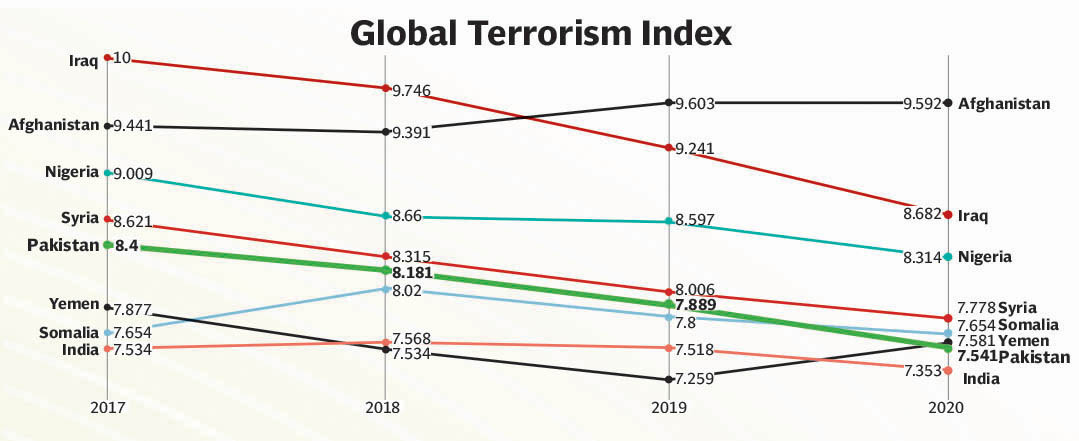
“The Taliban takeover of Afghanistan will undoubtedly inspire and strengthen the resolve of jihadists fighting elsewhere in the world. It is a victory over a superpower, proof that God is on their side,” says Jenkins. “It may also have particular material benefits for the TTP, which may be able to more easily use Afghanistan as a sanctuary and potential base for support.” However, he believes this will depend on the government of Pakistan ability to persuade the Afghan Taliban to not support the TTP or allow the group to use Afghanistan as a base.
Juergensmeyer sees the fall of Kabul through a different lens. “The victory of the Afghan Taliban also means that now the movement has the hard task of governing not just opposing, and by necessity this means a certain amount of compromise and realistic assessments,” he says.
Inam, meanwhile, doesn’t see the TTP benefiting from the Taliban ascendancy in Afghanistan because he believes the group is a “bunch of criminals and thugs” with no ideological motivation. “When it was formed, the TTP’s raison d’être was to help the Afghan Taliban drive out foreign forces and then by extension fight the Pakistan military which was siding with the Americans,” he says.
“Now that the foreign troops have exited Afghanistan, if the TTP protracts its deadly campaign, its criminal face which was exposed after the 2014 APS attack will become more exposed. We have been saying all along that the TTP is a bunch of thugs and criminals who don’t subscribe to any ideology,” he says while referring to the deadly rampage at the military-run school in Peshawar in which nearly 150 pupils and teaching staff were massacred.
The Pakistani government is said to be considering amnesty for the TTP – a move Juergensmeyer calls “a calculated risk”. “By giving amnesty to some of the TTP, the hope is that they will become more responsible and moderate as well. We’ll see if that is the case,” he says but goes on to add: “Whether amnesty will help depends on whether the government has the strong sense that this will change the group and make them responsible citizens. One of the main things that enables a group to change is hope — the sense that there is an alternative life for them aside from guerilla fighting.”
Jenkins, however, believes amnesties are always difficult in negotiations with groups that have used terrorist tactics against civilian populations — kidnappings, bombings, murders. In conventional war, soldiers on both sides are “privileged combatants,” permitted to violate ordinary laws without criminal prosecution, but they must abide by the rules of war, which prohibit deliberately attacking civilian populations, holding hostages, and other tactics, which terrorists employ.
The TTP, he says, certainly has used terrorist tactics and has been appropriately designated to be a terrorist organisation by a number of countries as well as by the United Nations, although the UN does not have an official list of terrorist groups.
“The actions of terrorists are intended to create fear and alarm, which they do, but they also create enormous anger, which does not dissipate. As a prerequisite to negotiations, terrorists may demand amnesty, which arouses the wrath of the people whose families have been their victims,” he says. “Even when amnesties are agreed to, and the conflict is formally ended, private parties may seek vengeance against the former terrorists.”
Inam cautions that the word amnesty should not be used “loosely or incorrectly” because he believes the TTP could not be given blanket immunity. The government move might be aimed at finding a negotiated settlement or non-violent end to the TTP’s deadly campaign, he says. “Amnesty could be but not necessarily would be an outcome after the negotiated settlement. I would not go into the technical nitty-gritty of negotiated settlement.”
Before the mainstreaming of the erstwhile tribal regions, local tribes had a collective responsibility under a nineteenth century law to hand over to the government anyone accused of anti-state offences. That set of laws, known as Frontier Crimes Regulations, has been abolished after the tribal regions were merged with Khyber-Pakhtunkhwa province. Nonetheless adjudication of disputes could still be done on the basis of local customs and Islamic shariah in these tribal districts.
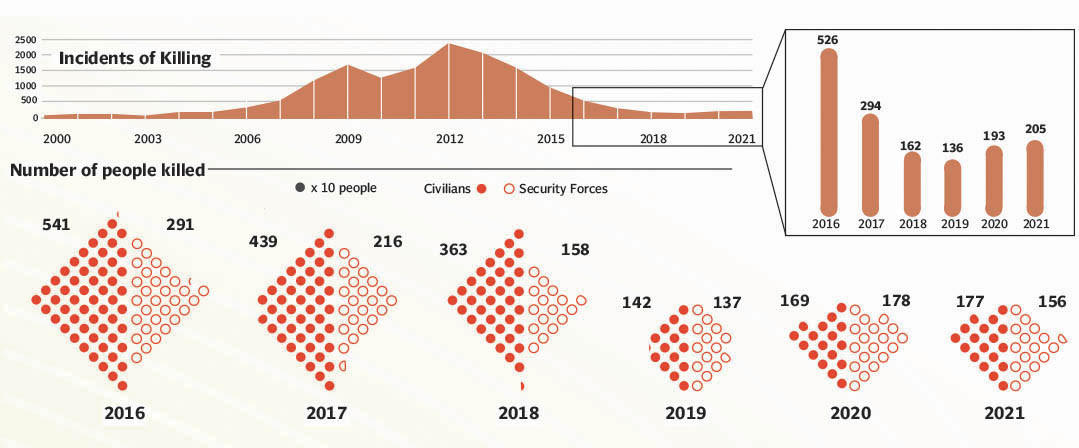
“If the local customs or Islamic shariah state that a person accused by the government is criminal, then those with pardonable offenses will be reintegrated in society, while those guilty of heinous crimes will be dealt with accordingly. And those who are reintegrated are given amnesty on the condition the tribe they belong to becomes their guarantor,” explains Inam, who has written extensively on the dynamics of militancy in the region.
The government decision to negotiate with the TTP and the talk of amnesty has upset the families of APS victims. Juergensmeyer says it is understandable for families of victims to resent any overtures or concessions to the militants. “The government should reach out to them in advance of such talks and give them the assurance that this is for the larger good of preventing more terrorism, and more loss of innocent life in the future.”
Jenkins and Inam agree with Juergensmeyer.
“A government entering into negotiations with groups that have used terrorist tactics must be aware that this is a delicate and difficult issue and continually listen to and address the understandable concerns of the families,” says Jenkins. “Popular opposition to amnesties has derailed peace negotiations.”
Inam says the reaction of the trauma-stricken families of APS victims is natural. But he doesn’t think the government would ever offer general amnesty to the TTP. “This doesn’t mean the perpetrators of heinous crimes would be allowed to go Scot-free. They will have to be held accountable for their crimes – either through force, or through shariah, or through law of the land,” he says. “Not everyone could be or would be reintegrated in society.”
The Pakistani military has carried out a series of operations to purge the regions along the border with Afghanistan of militants. Intelligence-based operations continue to eliminate the “residual/latent threat of terrorism” and consolidate the gains of earlier offensives.
Inam, the retired general who has served in these border regions, says that fighting and talking at the same time has always been the government’s strategy. Before the founding of TTP by Baitullah Mehsud in 2007, the government had negotiated with various groups. “In the past, we talked to Baitullah Mehsud, Hafiz Gul Bahadur and Nek Muhammad and negotiated peace deals in 2004, 2005 and 2006 which were basically for ceasefire and cessation of hostilities,” says Inam while referring to the commanders of militant factions who were mostly killed later in US drone strikes.
He believes sweeping generalisation of militancy in Pakistan’s bordering districts as religiously-motivated terrorism is wrong. “The TTP faction in Kurram and Orakzai districts is ideologically closer to al Qaeda. Militants in Khyber are thugs and criminals. TTP’s Swat faction was motivated by a desire for Islamic Shariah in Malakand,” he says. “The Mehsuds and the Wazirs [in North and South Waziristan] and TTP’s Bajaur faction were unhappy with the use of Pakistan’s soil against Afghanistan.” Since the TTP is an assortment of groups with diverse objectives, Inam says its chain of command is not as strong as Afghan Taliban’s.
In the TTP, there are irreconcilables determined to fight on, but there may also be pragmatic elements willing to live a normal life. If the government gives in to the righteous anger, gives up on a non-violent solution, and employs military means, then it will lose the reconcilables and ignite more violence, perhaps deadlier than before. But negotiated peace is not easy to come by. Negotiating with a non-monolithic group pursuing different objectives could be tricky and treacherous. So, government negotiators should not rush for a deal because a bad deal could be worse than no deal.
